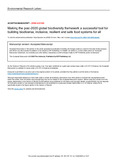| dc.contributor.author | Gassner, Anja | |
| dc.contributor.author | Dobie, Philip | |
| dc.contributor.author | Vidal, Adriana | |
| dc.contributor.author | Somarriba, Eduardo | |
| dc.contributor.author | Pythoud, Francois | |
| dc.contributor.author | Kumar, Chetan | |
| dc.contributor.author | Laumonier, Yves | |
| dc.contributor.author | Chhatra, Ashwini | |
| dc.date.accessioned | 2020-08-19T15:49:15Z | |
| dc.date.available | 2020-08-19T15:49:15Z | |
| dc.date.issued | 2020-08 | |
| dc.identifier.uri | https://repositorio.catie.ac.cr/handle/11554/9486 | |
| dc.description.abstract | COVID-19 has exposed the vulnerability of our economies to shocks, and it has laid bare deep inequalities in our society that threaten to derail the Sustainable Development Goals. Governments around the world are looking for recovery options that deliver new jobs and businesses. Few sectors link job creation so closely to sustainable green production as the food sector. It is the largest source of employment in many countries in the global South. At the same time cities depend upon imported food that is produced in far-away countries and shipped around the world. The trillions of dollars to be invested in recovery from COVID-19 offers an unprecedented opportunity for a clean, green and just transition to a more biodiversity-friendly agricultural and food system. Key among the political opportunities to shift the post-pandemic world towards sustainability and resilience are the ongoing deliberations of the Post-2020 Global Biodiversity Framework. The Post-2020 Framework will be the precedent for national governments to bridge economic action with the key need for a green, resilient recovery. The United Nations Convention on Biological Diversity (CBD) has traditionally seen agriculture as one of the biggest threats to biodiversity and has been actively promoting the protection of natural ecosystems by concentrating its efforts on preventing further expansion of agriculture. But it has not explicitly recognized the importance of mixed, diverse agricultural landscapes for their contribution to the conservation of wild biodiversity. The CBD has an opportunity to bring its influence to bear on international policy favouring investments in local production and marketing capacity to replace imported food and beverages. This will contribute to both COVID-19 recovery through creation of rural jobs and income and empowering governments and consumers to support diverse, mixed agricultural systems that conserve and enhance biodiversity as well as reduce greenhouse gas emissions. | |
| dc.language.iso | en | es_ES |
| dc.publisher | IOP Publishing, Bristol (Reino Unido) | es_ES |
| dc.relation.ispartof | Environmental Research Letters | es_ES |
| dc.relation.uri | https://doi.org/10.1088/1748-9326/abae2b | en_EN |
| dc.rights | info:eu-repo/semantics/openAccess | es_ES |
| dc.subject | BIODIVERSIDAD | es_ES |
| dc.subject | CONSERVACION DE LA DIVERSIDAD BIOLOGICA | es_ES |
| dc.subject | RESILIENCIA | es_ES |
| dc.subject | AGROECOLOGIA | es_ES |
| dc.subject | VIDA SILVESTRE | es_ES |
| dc.subject | AGRICULTURA | es_ES |
| dc.subject | PAISAJE AGRICOLA | es_ES |
| dc.subject | BIENESTAR SOCIAL | es_ES |
| dc.subject | EMPLEO RURAL | es_ES |
| dc.subject | COVID-19 | es_ES |
| dc.title | Making the post-2020 global biodiversity framework a successful tool for building biodiverse, inclusive, resilient and safe food systems for all | es_ES |
| dc.type | Artículo | es_ES |


